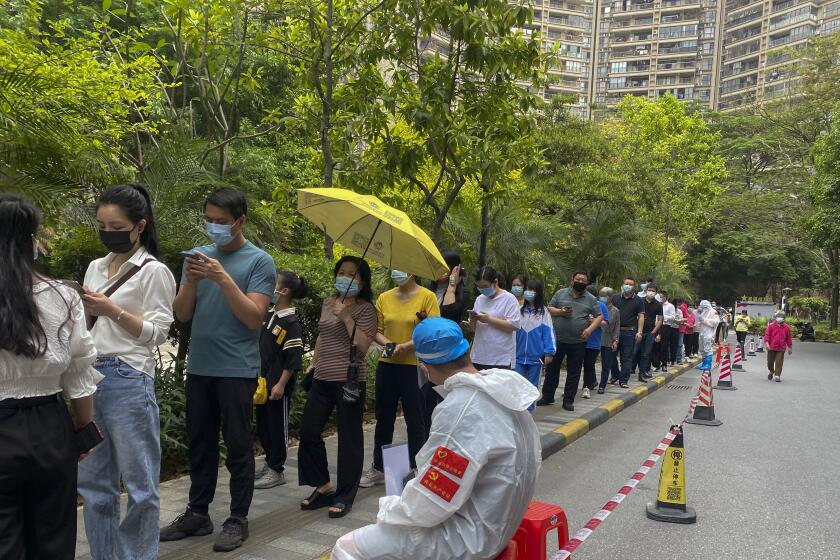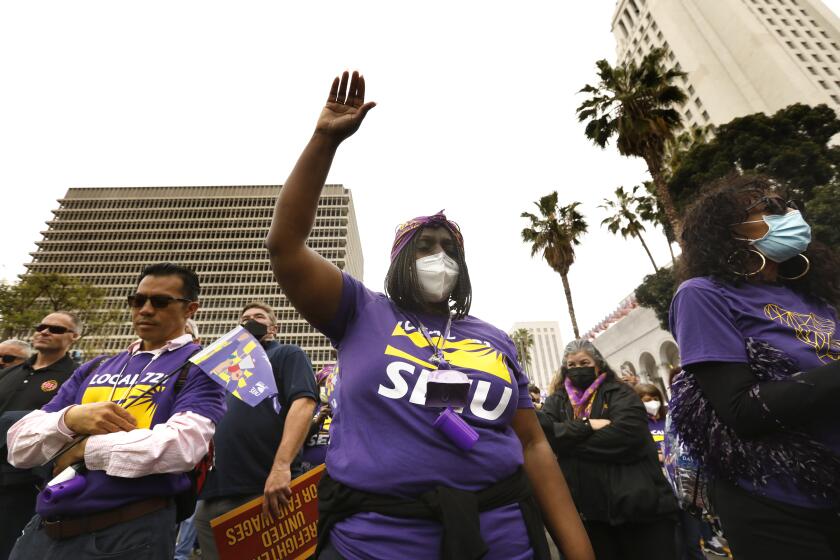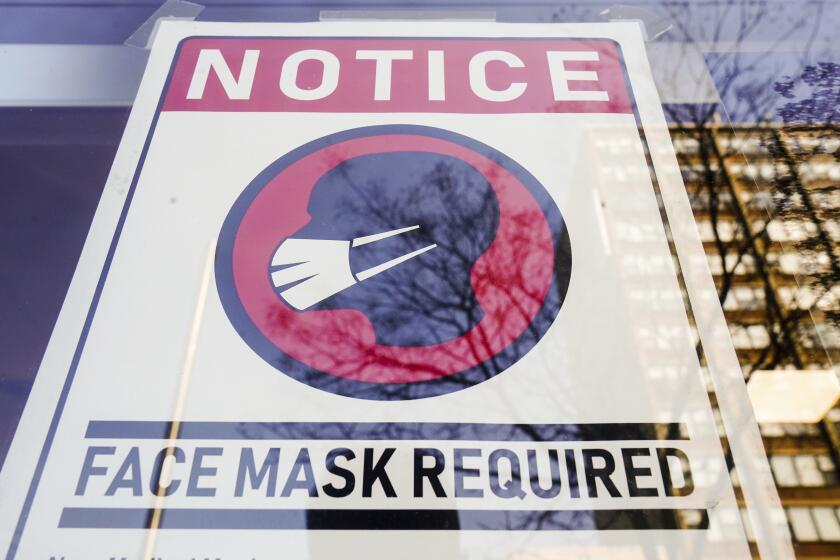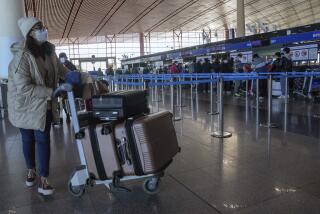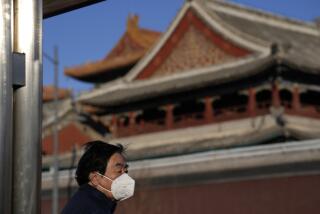Shanghai eases COVID shutdown, letting some residents out of their homes
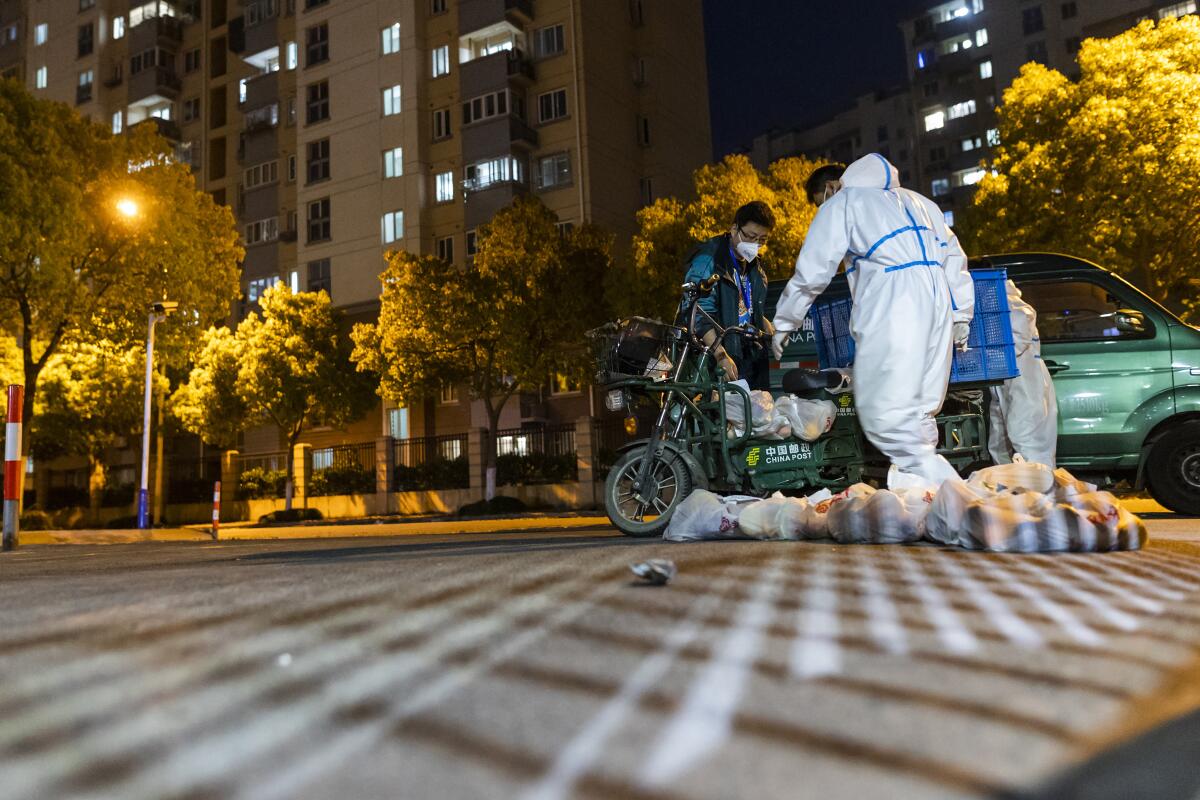
- Share via
BEIJING — Some residents of Shanghai were allowed out of their homes as the city of 25 million people eased a two-week-old coronavirus shutdown Tuesday after a video posted online showed what was purported to be people who ran out of food breaking into a supermarket.
About 6.6 million people can go outdoors but some must stay in their neighborhoods, the online news outlet the Paper reported, citing city officials. The government said some markets and pharmacies would reopen.
A health official warned that Shanghai doesn’t have the coronavirus under control despite easing restrictions.
“The epidemic is in a period of rapid growth,” said Lei Zhenglong of the National Health Commission at a news conference. “Community transmission has not been effectively contained.”
The abrupt closure of most businesses starting March 28 and orders to stay home left the public fuming about lack of access to food and medicine. People who test positive for the virus have been forced into sprawling temporary quarantine facilities criticized by some as crowded and unsanitary.
Meanwhile, the American government announced all “nonemergency U.S. government employees” would be withdrawn from its Shanghai Consulate. A Chinese Foreign Ministry spokesman defended the country’s handling of the outbreak and accused Washington of politicizing its evacuation.
Also Tuesday, the government of Guangzhou, a manufacturing and trading center northwest of Hong Kong, announced a new round of coronavirus testing for its 19 million people. Most access to the city was stopped after 27 infections were found Monday.
The unusual severity of Shanghai’s shutdown appeared to be driven as much by politics as by public health concerns.
The manufacturing hub of Guangzhou has closed itself to most arrivals as China battles a COVID-19 outbreak in its big eastern cities.
The struggle in China’s richest city is an embarrassment during a politically sensitive year, when President Xi Jinping is expected to try to break with tradition and award himself a third five-year term as leader of the ruling Communist Party.
China’s case numbers are relatively low, but the ruling party is enforcing a zero-tolerance strategy that has suspended access to major cities to isolate every infected person. Some officials have been fired for failing to act aggressively enough, which gives others an incentive to impose extreme measures.
The government reported 24,659 new cases through midnight Monday, including 23,387 with no symptoms. That included 23,346 in Shanghai, only 998 of whom had symptoms.
In Shanghai, more than 200,000 cases but no deaths have been reported in the latest wave of infections.
The government eased restrictions by announcing residents of Shanghai neighborhoods that have had no cases for at least two weeks would be allowed out of their homes starting Tuesday. It said they could go to any other area that also had no new cases during that time but were urged to stay home when possible.
Data show that for the seven-day period that ended Monday, an average of 960 new cases were reported daily countywide, which pencils out to 67 cases a week for every 100,000 residents. That’s up 23% from the previous week.
Such “prevention areas” have about 4.8 million people, the Paper reported, citing city officials. It said all but 500,000 of those were in less crowded suburbs.
An additional 1.8 million people in “control areas” with no new cases in the last week are allowed out but can’t leave their neighborhoods, the report said.
Another 15 million people in “quarantine areas” that have had infections in the last week still are barred from leaving their homes. The report gave no indication of the status of the remaining 3.4 million people in the official population.
The shutdown of Shanghai, home of the world’s busiest port and China’s main stock exchange, has prompted fears that manufacturing and global trade might be disrupted.
Automakers in Shanghai, a manufacturing center, have suspended or reduced production because of interruptions in supplies of components. The port’s management says operations are normal, but the European Union Chamber of Commerce in China has estimated the volume of cargo it handles every day has fallen 40%.
Residents complained the shutdown left them without access to food or medicine and unable to look after elderly relatives who lived alone.
The government distributed packages of vegetables and other food for a few days at least twice to some households. Others said they received nothing.
A video that circulated online Saturday showed what the caption said were people in the Songjiang district breaking into a supermarket and carrying away cartons of food.
Philadelphia has become the first major U.S. city to reinstate its indoor mask mandate after seeing a sharp increase in coronavirus infections.
Police denied the event occurred in Shanghai. A police statement Tuesday said the video was posted by a man in Kunshan, west of Shanghai, but did not say when or where it was shot. It said the man received unspecified “administrative penalties” for “disrupting public order by fabricated facts.”
The Associated Press was unable to find the source of the video or verify when and where it was shot.
Official plans in late March called for suspending access to districts of Shanghai for four days at a time while residents were tested. After case numbers soared, that changed to an indefinite citywide shutdown with only a few hours’ notice.
Despite a promise by city officials to improve food supplies, residents said online grocers often sold out early in the day or were unable to deliver. Vendors said they added hundreds of employees to speed deliveries.
The U.S. State Department last week advised Americans against travel to China because of “arbitrary enforcement” of laws and coronavirus restrictions. It cited a risk of “parents and children being separated.”
On Tuesday, a State Department statement said the U.S. government decided “it is best for our employees and their families to be reduced in number” because of “changing circumstances on the ground.”
The Chinese Foreign Ministry criticized the announcement and said the government’s anti-virus work is “scientific and effective.”
“The United States should immediately stop attacking China’s epidemic prevention policy, stop political manipulation with the epidemic issue and stop smearing and discrediting China,” said a ministry spokesman, Zhao Lijian.
More to Read
Sign up for Essential California
The most important California stories and recommendations in your inbox every morning.
You may occasionally receive promotional content from the Los Angeles Times.
